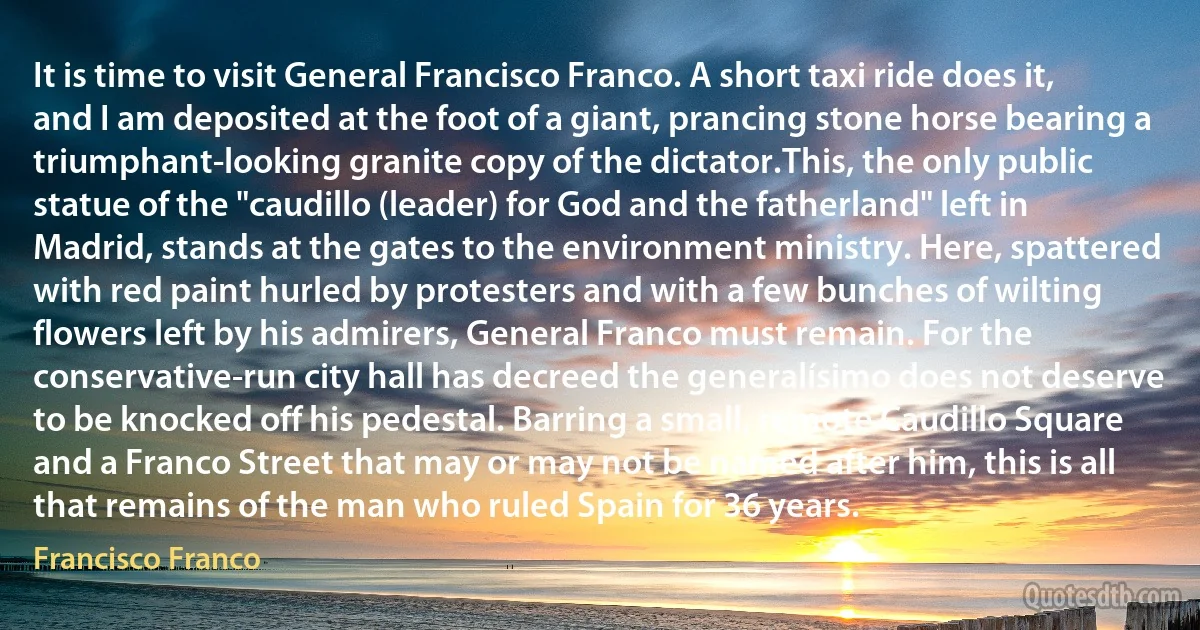
It is time to visit General Francisco Franco. A short taxi ride does it, and I am deposited at the foot of a giant, prancing stone horse bearing a triumphant-looking granite copy of the dictator.This, the only public statue of the "caudillo (leader) for God and the fatherland" left in Madrid, stands at the gates to the environment ministry. Here, spattered with red paint hurled by protesters and with a few bunches of wilting flowers left by his admirers, General Franco must remain. For the conservative-run city hall has decreed the generalísimo does not deserve to be knocked off his pedestal. Barring a small, remote Caudillo Square and a Franco Street that may or may not be named after him, this is all that remains of the man who ruled Spain for 36 years.
Francisco FrancoRelated topics
barring bearing city dictator few foot general giant granite hall horse leader left man ministry off paint prancing public red remain ride short small square stone street time visit remains years taxi gates madrid bunches francoRelated quotes
Contrary to several conflicting stories, I got the name "Count" right in Kansas City in 1936 while at the Reno Club. I was known as Bill Basie at that time. One night, while we were broadcasting, the announcer called me to the microphone for those usual few words of introduction. He commented that Bill Basie was a rather ordinary name, and further that there were a couple of well-known bandleaders named Earl Hines and Duke Ellington. Then he said, "Bill, I think I'll call you Count Basie from now on. Is that all right with you?" I thought he was kidding, shrugged my shoulders and replied, "OK." Well that was the last time I was ever introduced as Bill Basie. From then on, it was Count Basie, and I never did lose that nickname. It's funny the way those things will stick.

Count Basie
My work is in a complete transformation. Lately, in my studio in Amsterdam, 'beings' re-emerge more and more, but I have repainted all the canvases that I have brought with me [from Amsterdam to Paris]. It is matter itself. On the canvas, no discovery, no personal drama, no submission to a rhythm.... freed from 'Victory Boogiewoogie' [title of the last work of Piet Mondrian, 1944], bepop, bepop, we free ourselves from rhythm, we are not there yet, but it is coming... Now I paint stains, bigger stains, colours endlessly reapplied one upon the other, I scrape and I put down new stains of colour unto nothing remains but one great plane, concentrated and linked at the same time, suddenly a vivid red or yellow and the canvas and being merge.

Karel Appel
In the case of a novel, or any imaginative work, especially if the tone is poetic, my own preference is for ending with a touch of symbolism which shall leave the reader brooding. A fine novel, a well-written story, "proves" nothing. Certain characters have played their parts, life goes on, and the final passage may be allowed to remain with one foot in the air, as is the case with some of Chopin's conclusions. But there is no absolute rule in such matters, and there are epic novelists who like to end on a powerful crescendo, as Ravel does in Bolero, or Dvorak in the New-World Symphony. Composition has features which are common to all the arts, and the author can learn as much about his business in the concert hall as in the library.

André Maurois
It is a strange irony, but no small compensation, that the making of weapons of destruction should afford the occasion to humanise industry. Yet such is the case. Old prejudices have vanished, new ideas are abroad; employers and workers, the public and the State, are favourable to new methods. This opportunity must not be allowed to slip. It may well be that, when the tumult of war is a distant echo, and the making of munitions a nightmare of the past, the effort now being made to soften asperities, to secure the welfare of the workers, and to build a bridge of sympathy and understanding between employer and employed, will have left behind results of permanent and enduring value to the workers, to the nation and to mankind at large.

David Lloyd George
Frankly, this is my position: I have been painting for two years, and my only models have been your [ Monet's ] own works; I have been following the wonderful path you broke for us. I have always worked regularly and conscientiously, but without advice or help, for I do not know any impressionist painter who would be able to guide me, living as I am in an environment more or less hostile to what I am doing. And so I fear I may lose my way, and I beg you to let me see you, if only for a short visit. I should be happy to show you five or six studies; perhaps you would tell me what you think of them and give me the advice I need so badly, for the fact is that I have the most horrible doubts, having always worked by myself, without teacher, encouragement, or criticism.

Paul Signac
